According to a new study, women who drink caffeinated coffee showed a 20% lower risk of depression than non-coffee drinkers. [More]
depression
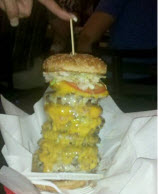
Study: Bad Food May Spur Depression
While the idea of a giant, greasy fast food burger and a plate full of fries may put a smile on your face, actually ingesting the meal may damage your psyche. Spanish researchers who tracked the dining habits of more than 12,000 people over six years found that those who ate the most trans fats — which are found in some fast food and pastries — were 48 percent more likely to become depressed. [More]
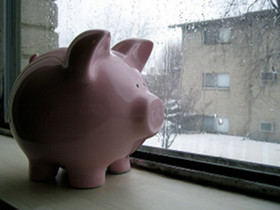
Savings Rate Goes Up, But Spending Doesn't
As a nation, we saved more of our paychecks last month than any time since last September–nearly 4% of income went unspent. That worries economists, because it means we’re not spending at a high enough rate to support an economic recovery. But as the Washington Post notes, since unemployment remains high and most of the recent wage growth came from the government, consumers aren’t exactly comfortable with buying something shiny and new just because it’s on sale. [More]

Study: Depressed People Eat 50% More Chocolate
Having a bit of chocolate when you’re down is something just about everyone has done at some point in their life. But a new study shows that those people who demonstrate signs of depression tend to eat 50% more chocolate than those who don’t. [More]

Depressed Lady Loses Benefits Because Of Her Facebook Photos
A depressed woman has lost her benefits because her insurance agent found Facebook photos where she appears to be having fun.
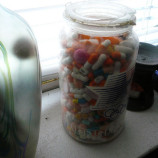
Lexapro's Marketing Plan Shows How Drug Maker Pushes New Drugs
The Senate just released 88 pages of a confidential 270+ page marketing plan by Forest Laboratories, created in 2004 and focused on how to get doctors to prescribe the antidepressant Lexapro over similar but cheaper alternatives such as Celexa. The New York Times notes that the line between marketing and education seems to be heavily blurred, which may not surprise you. There are, however, two interesting notes for consumers who may be taking Lexapro.

../..//2009/03/08/fox-news-reports-that-there/
Fox News reports that there are now bread lines in Southern California. Still no word yet on the reappearance of tin can fires. [Fox News]
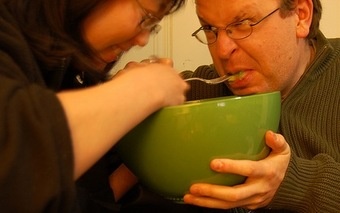
Sharing Restaurant Dishes Is Becoming Slightly More Acceptable
Good news thrifty diners, you’re not the only ones asking to share dishes at restaurants these days. Thanks to the recession, it’s becoming acceptable for everyone to split their dishes, and restaurants aren’t complaining. “Now all bets are off,” said David Pogrebin, manager of the snazzy French restaurant Brasserie. “People are not ashamed of being frugal.”
Don't Miss Frontline's "Inside The Meltdown" Tonight
Tonight at 9 eastern Frontline’s new documentary “Inside The Meltdown” will debut on PBS and online. We’ve only seen the trailer, but the press release makes it sound like the scariest documentary in the history of the universe.

What Is A Depression And Are We In One?
Yes, we’re saying the “D” word. Now that we’ve officially entered a recession — it’s time to wonder if we’re in a depression. We’d love to be able to give you a yes or no answer, but according to Marketplace’s personal finance guy, Chris Farrell, nobody agrees about what makes a depression different from a recession.

The Poverty-Stricken Masses Are Flocking To Libraries
Why waste precious cash at Borders and Barnes & Noble when you can go to the library for free? It’s a simple question that is causing traffic local libraries to spike as flocks of new patrons register for library cards. We’ve praised libraries before, but it takes a depressing recession to convince people that yes, even they could use an extra buck in their wallet.
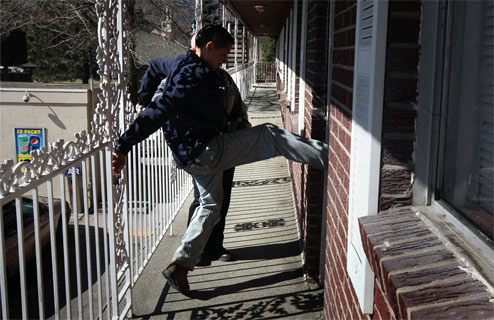
Half Of Doctors Routinely Prescribe Placebos
The New York Times says that half of doctors responding to a nationwide survey admitted to routinely prescribing placebos.

Global Financial Panic: At Least We're Not Iceland…
Floyd Norris at the New York Times is live blogging the global financial panic today, and has compiled a list of how the world’s markets have performed in October. Compared to some countries, our situation doesn’t seem that bad. Which is scary.
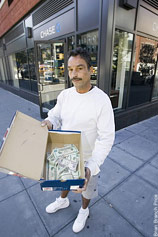
Don't Keep Your Money In A Shoebox, Or At Least Don't Pose For A Photo With It
Thanks to the New York Post, we know there’s a 48-year-old man named Richard Cruz somewhere in Manhattan who’s hoarding his daughter’s college fund in a shoebox. We even know what he looks like, because in the photo that accompanies the article, Cruz is posing on the sidewalk with his withdrawn cash like he just won the shoebox lottery. “‘No one hides their money under a mattress any more,’ he said. ‘That’s the first place people would look.'” Good thinking.

Sadness Makes You Spend More
Is [it] a biologically driven disease of the brain, a learned habit run amok, an addiction in its own right or a symptom of the other dysfunctions—most notably depression—that so often accompany it?
../..//2008/02/08/sad-people-spend-more-money/
Sad people spend more money. Must be why so many commercials seem designed to induce feelings of anxiety and insecurity, even if they’re delivered within a “humorous” context. [CNN]




